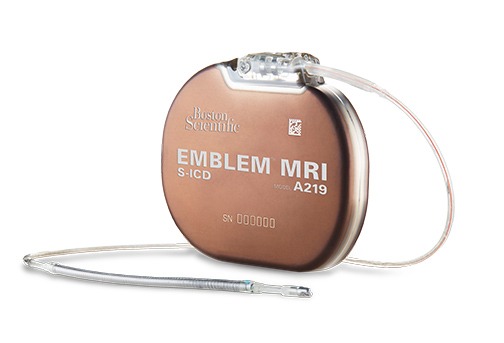
Boston Scientific has initiated a worldwide study (MADIT S-ICD) that will evaluate the survival benefit of patients treated with the Emblem MRI Subcutaneous Implantable Defibrillator (S-ICD) System who are aged 65 and older with a history of prior heart attack, diabetes and moderately reduced left ventricular ejection fraction. This subset of patients is at increased risk for sudden cardiac arrest, but not currently considered guideline-appropriate candidates for implantable cardiac defibrillators.
Michael Giudici, principal investigator and director of Arrhythmia Services at University of Iowa Hospitals and Clinics, Iowa, USA, enrolled the first patient in the Multicenter automatic defibrillator implantation trial with Subcutaneous Implantable Cardioverter Defibrillator (MADIT S-ICD) trial.

The trial is intended to determine if the Emblem MRI S-ICD System improves survival as compared to patients remaining on their current medical therapy. The device is a treatment option for patients at risk of sudden cardiac arrest that leaves the heart and vasculature untouched, thereby reducing the risk of some complications associated with transvenous implantable cardioverter defibrillators. Eliminating device leads within the vasculature is particularly important for patients with diabetes who often are at an increased risk of infection and vascular access issues.
“Our hypothesis is that the S-ICD device may reduce all-cause mortality in this high-risk cohort of cardiac patients with diabetes,” says Valentina Kutyifa, principal investigator and research assistant professor of cardiology at the University of Rochester Medical Center, Rochester, USA. “The value of eliminating unnecessary patient complications by implanting a defibrillator which does not require intracardiac leads was an important factor in our decision to utilise the S-ICD device when designing this trial.”
The prospective, randomised, multicentre MADIT S-ICD trial will enrol up to 1,800 patients at approximately 100 sites worldwide and is designed as one of two clinical studies piloting the company’s WIN-Her Initiative which aims to ensure adequate representation of women in clinical trials. Between 2000 and 2007, the average number of women enrolled in USA cardiovascular device clinical trials was only one-third of the total study populations.1 The WIN-Her Initiative will provide recruiting materials customised for women participating at US sites in an effort to increase the number of female enrollees.
A company release states that the Emblem MRI S-ICD System has been accepted for parallel review for a new indication by the US Food and Drug Administration (FDA) and the Centers for Medicare & Medicaid Services. The two organisations will concurrently review the MADIT S-ICD trial data as well as other relevant information to determine FDA approval and Medicare coverage of the device for patients aged 65 and older with a history of prior heart attack, diabetes and moderately reduced left ventricular ejection fraction.
All MADIT trials have been sponsored by Boston Scientific, but independently conducted by the MADIT Executive Committee and the Heart Research Follow-up Program at the University of Rochester Medical Center.












